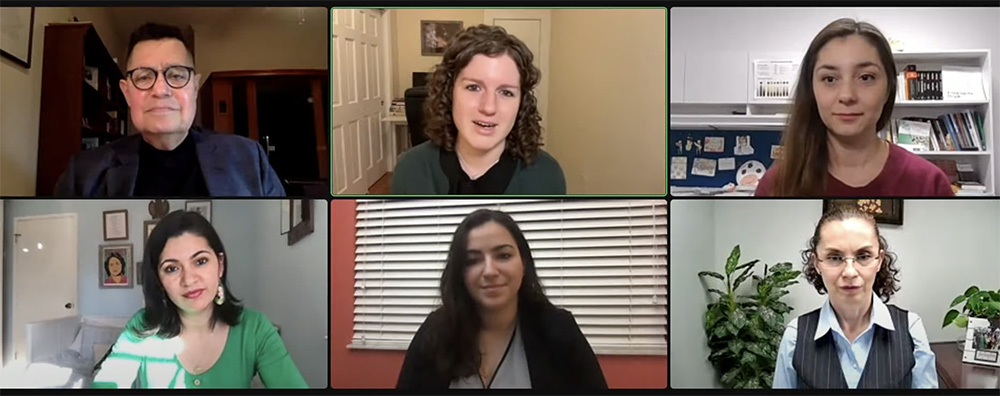
The panelists for "What Is Going on with Latino Voters?: Faith, Politics, and the Latino Community in 2022," a Feb. 15 event sponsored by Georgetown University's Initiative on Catholic Social Thought and Public Life. From left, top row: Luis Ricardo Fraga, Anna Gordon and Ana Gonzalez-Barrera; bottom row: Gabby Trejo, Sabrina Rodríguez and Maria de Lourdes Valencia. (NCR screenshot)
Understanding that Latino voters are not monolithic takes research, engagement and encounter, panelists said at a Feb. 15 event sponsored by Georgetown University's Initiative on Catholic Social Thought and Public Life.
"What Is Going on with Latino Voters?: Faith, Politics, and the Latino Community in 2022" asked panelists to talk about the biggest misconceptions about Latinos, who make up the largest minority ethnic group in the United States, with 32 million eligible voters, according to data from Pew Research Center presented at the event.
Although Latinos still overwhelmingly support Democrats, there was a jump in support for Donald Trump from 2016 to 2020, explained Luis Ricardo Fraga, director of the Institute for Latino Studies at the University of Notre Dame. But the 32% of Latinos who voted for Trump in 2020 is still not much higher than previous support among Latinos for Republican presidential candidates, he said.
Sabrina Rodríguez, national political correspondent for Politico, added, "It is not unprecedented that there are Latinos that vote Republican. And after the 2020 election, I myself as a journalist have had to navigate this. How much alarm do we put on this?"
Ana Gonzalez-Barrera of the Pew Research Center noted that Catholic Latinos are more likely to vote Democratic, as are religiously unaffiliated Latinos, but Protestant, especially evangelical, Latinos are more likely to vote Republican.
"Latino Catholics consider their conscience to vote, a conscience guided by their Catholic belief and values," said Maria de Lourdes Valencia, associate director of the Culture of Life office in the San Diego Diocese.
"My job is to promote education, specifically Catholic social teaching, and also to create awareness that even if we have been called to work in a specific ministry, we have common ground, which is the principle of protection of life and human dignity," said Valencia, who works mainly with young Catholic Latinos.
Fraga also noted that Catholic Latinos also have their own internal diversity and spectrum of "progressive and traditional Catholics."
Advertisement
"It's very important also to distinguish between what Latinos say is most important for the country as a whole or for them generally, versus what do you think is the most important issue confronting Latino communities?" he added.
Contrary to popular belief, immigration is not the only topic that guides Latino voters, Rodríguez said. Depending on where in the country Latinos live, their priorities shift, she explained.
"Many of these other issues are as important [as immigration] or more important when we're talking about Latino voters," she said.
During the 2020 election, the economy, COVID-19 and health care were some of the top issues for Latinos, Gonzalez-Barrera said.
Many Latino voters had jobs as essential workers who risked their lives during the pandemic, and undocumented people knew they could not lean on the government for support, said Gabby Trejo, executive director of Sacramento Area Congregations Together (ACT), which does community organizing within the Catholic Church among Latino immigrants, Mexican Americans and young people.
Latino parents in particular had to juggle the stress of not being able to support their children who may have fallen behind while doing virtual education, Trejo said.
Insecurity around housing was another important issue for Latinos during the pandemic, she said.
"I would say that on top of all the issues that we have identified as a community is really this fight for freedom of being recognized as children of God, to be recognized with our full dignity," Trejo said.
The push and pull of social justice and reproductive rights also come into play when it comes to Catholic Latino voters, Fraga said. While some Catholic voters prioritize abortion, for others social justice is a top issue.
"It would be nice to say things line up neatly, but candidates rarely do and certainly parties rarely line up neatly, either as traditional or as progressive. And so it becomes a balancing act," he said.
According to data from the Pew Research Center, fewer than half of eligible Latino voters actually cast a ballot, so increasing turnout is a priority. Rodríguez and Fraga said investment and engagement early on in Latino communities is needed to increase voter turnout across the board.
"According to U.S. Catholic bishops in the Catholic tradition, responsible citizenship and participation in political life is a moral obligation," Valencia said.
At the end of the webinar, Valencia reminded listeners that Pope Francis has called Catholics to "dialogue with people that do not necessarily agree with our principles or our beliefs and to encourage communication and constant dialogue with them."







